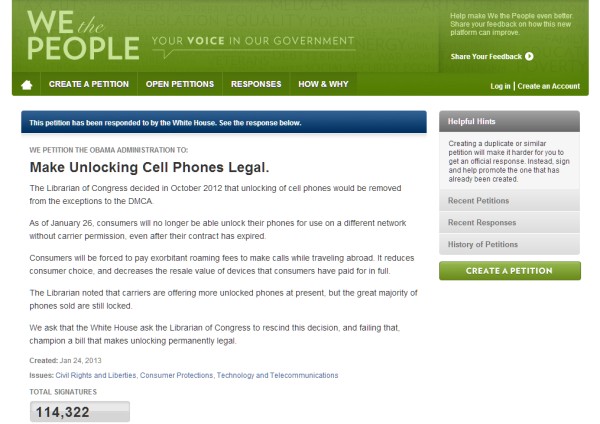Not surprisingly, the requisite 100,000 signatures needed in order to require a reply from the White House was quickly met and all that remained was that reply; which we finally got today.
As it turns out the White House agrees with the 114,000+ (final signature count by the cutoff point), and they go even one step further by suggesting that tablets should be included as well. One of the reasons the White House agrees that this unlocking law needs to be changed isn't just about new devices, but also those smartphones and tablets that are bought second hand and consumers’ choices.
According to the statement issued by the White House (see the full statement below) the Obama Administration would support a range of options in order to address the issue, even to the point of extremely narrow legislation that would make it clear that neither technological locks, or criminal law, should prevent the consumer from switching carriers when they are no longer bound by a service contract.
It should be noted that the Federal Communications Commission (FCC) is backing the government on this issue.
Here is the full statement in reply to the petition:
Thank you for sharing your views on cell phone unlocking with us through your petition on our We the People platform. Last week the White House brought together experts from across government who work on telecommunications, technology, and copyright policy, and we’re pleased to offer our response.
The White House agrees with the 114,000+ of you who believe that consumers should be able to unlock their cell phones without risking criminal or other penalties. In fact, we believe the same principle should also apply to tablets, which are increasingly similar to smart phones. And if you have paid for your mobile device, and aren’t bound by a service agreement or other obligation, you should be able to use it on another network. It’s common sense, crucial for protecting consumer choice, and important for ensuring we continue to have the vibrant, competitive wireless market that delivers innovative products and solid service to meet consumers’ needs.
This is particularly important for secondhand or other mobile devices that you might buy or receive as a gift, and want to activate on the wireless network that meets your needs — even if it isn’t the one on which the device was first activated. All consumers deserve that flexibility.
The White House’s position detailed in this response builds on some critical thinking done by the President’s chief advisory Agency on these matters: the Department of Commerce’s National Telecommunications and Information Administration (NTIA). For more context and information on the technical aspects of the issue, you can review the NTIA’s letter to the Library of Congress’ Register of Copyrights (.pdf), voicing strong support for maintaining the previous exception to the Digital Millennium Copyright Act (DMCA) for cell phone carrier unlocking.
Contrary to the NTIA’s recommendation, the Librarian of Congress ruled that phones purchased after January of this year would no longer be exempted from the DMCA. The law gives the Librarian the authority to establish or eliminate exceptions — and we respect that process. But it is also worth noting the statement the Library of Congress released today on the broader public policy concerns of the issue. Clearly the White House and Library of Congress agree that the DMCA exception process is a rigid and imperfect fit for this telecommunications issue, and we want to ensure this particular challenge for mobile competition is solved.
So where do we go from here?
The Obama Administration would support a range of approaches to addressing this issue, including narrow legislative fixes in the telecommunications space that make it clear: neither criminal law nor technological locks should prevent consumers from switching carriers when they are no longer bound by a service agreement or other obligation.
We also believe the Federal Communications Commission (FCC), with its responsibility for promoting mobile competition and innovation, has an important role to play here. FCC Chairman Genachowski today voiced his concern about mobile phone unlocking (.pdf), and to complement his efforts, NTIA will be formally engaging with the FCC as it addresses this urgent issue.
Finally, we would encourage mobile providers to consider what steps they as businesses can take to ensure that their customers can fully reap the benefits and features they expect when purchasing their devices.
We look forward to continuing to work with Congress, the wireless and mobile phone industries, and most importantly you — the everyday consumers who stand to benefit from this greater flexibility — to ensure our laws keep pace with changing technology, protect the economic competitiveness that has led to such innovation in this space, and offer consumers the flexibility and freedoms they deserve.
R. David Edelman is Senior Advisor for Internet, Innovation, & Privacy
[shared from Weave for Windows Phone]
Sent from my Windows Phone


Be First to Comment